
— Ukraine Crisis Sparks Strong Words as Top Diplomats & Polish Defense Experts Convene at Yale University —
• West must beware of bargaining allowing Russia to create “sphere of influence”
• NATO needs to adjust “enlargement model” in light of Russian interests
• Poland beefs up defenses: adds missiles, attack helicopters, US now has tanks on Polish soil
• Crimea viewed as Russian negotiation “sticking point” with West
New Haven, CT – Yale University was the site of spirited dialogue on the Ukraine conflict — and strong words against Putin — at the American Polish Advisory Council’s (APAC) 2014 annual conference, held Sunday afternoon, Dec. 7. APAC, a non-partisan, non-profit national network focused on a Polish-American agenda, drew some of the most vocal, high-level critics yet of Russia’s military actions in the Ukraine, Crimea and more.
Key speakers such as Poland’s Ambassador to the United Nations, the country’s Undersecretary of State for Foreign Affairs, a Russian expert from the United State Military Academy, and a Polish general all expressed strong words for the aggressive regime of Putin, insisting that Russian masses were not behind the leader’s military actions. Putin was said to be “acting rational according to his own standards,” but far from fooling the West, was instead “trying to pull the wool over eyes of Russian people,
” who were not blinded and have indicated minimal support for intervention in the Ukraine. On a more ominous note, Poland’s Ambassador to the UN, Boguslaw Winid, warned that were Putin to intervene in the Baltic States, it “could mean a global confrontation.”
“Putin, he know what it means to be deterred,” added Ambassador Winid. “Even with the shortages we have in NATO, still this is the most powerful alliance in the world.”
The security and defense experts speaking at the APAC conference warned that the West must be careful in bargaining with Russia since that might allow it to create a “sphere of influence.” Deep concerns were also expressed for the eastern Ukraine population surviving winter since areas of conflict — previously cut off from Ukrainian state funding — were now getting little in the way of help from Russia.
APAC’s 2014 conference, titled Poland’s Emerging Role in Shaping Global Security and U.S.-Poland Partnership, drew experts expounding on security challenges and strategic relationships between the U.S. and Poland.
The conference was spearheaded by Former Ambassador, U.S. Lt. Gen. (ret.) Edward L. Rowny, together with Executive Director of APAC, Darek Barcikowski.
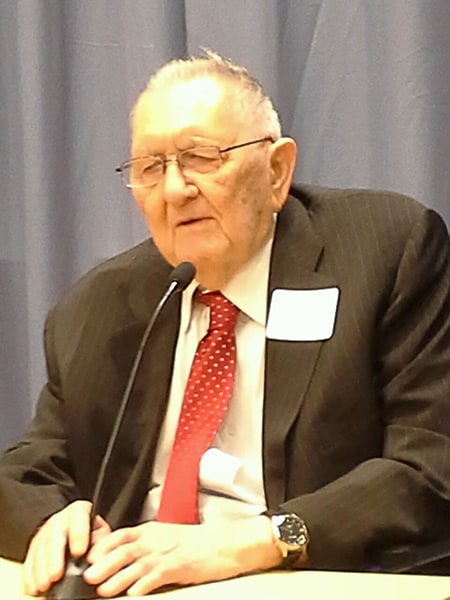
Amb. Edward Rowny-Founder of APAC.
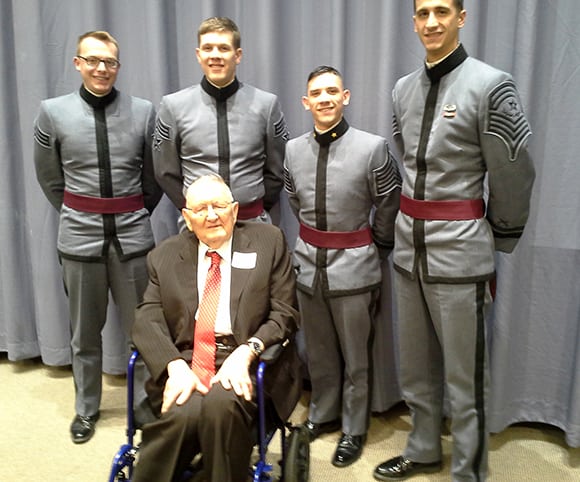
Amb.Rowny with Kosciuszko Cadets from West Point.
They were joined by Polish Ambassador Winid; Poland Undersecretary for Foreign Affairs, Artur Nowak-Far; Political Science Professor Thomas Sherlock from the United States Military Academy; and Brig. Gen. Jaroslaw Strozyk, among others.
There were about 130 participants from all over the United States, including number of representatives from the Ukrainian-American Community, also some faculty members, like Krystyna Illakowicz, Head of the Polish Department at Yale and some students from Yale.
Comments from Ambassador Winid:
On EU response to the Ukraine crisis: “What was doable was done. The EU does not consist of 28 Polands.” He warned, however, “You will have an entirely different situation if Putin regains the offensive.”
On NATO and the region: Winid noted NATO as concentrating on “rapid reaction forces for a wide range of activities”, “sustainability at a distance”, and “more flexible, more vibrant ways to reach, to protect, to deter like [the] Ukraine crisis.”
Winid noted that it is recommended that NATO members spend a percentage of GDP on military defense and modernization, or 2% and 20% respectively. He added that while Poland often exceeds those numbers, other members fall far short. Said Winid, “We don’t like free riders.”
Particular to the Ukraine crisis, he added that for some members, “This is just one of the conflicts.” He relayed comments from a NATO associate from Africa, who said of the Ukraine crisis, “When two elephants are fighting, usually you just stay back.”
On Russia military strength:
Winid pointed out that Russia’s escalation in the Ukraine was made possible by a defense budget that grew “quite rapidly”, and Russia was a “spending these resources more wisely than before.” In analyzing Russia’s military effectiveness, he noted a “big change” in Russian’s Ukraine capabilities compared to Georgia in 2008.
Comments from Undersecretary Nowak-Far:
On Russian relations: “We want Russia to abide by international law and we do not see it. We do not recognize the annex of Crimea Peninsula. . . We expect Russia and Ukraine to restore [the] border and not anything else. . . . In the long term, we would like to maintain friendly relations. We recognize that we do not have aligned interests, but reconcile is what’s called foreign policy.”
Regarding the Baltics: “Poland is a good example of a transition economy and transition society. We know what we are talking about. It does not take too long to remember that we had lived in a different society, a lawless society.” He noted, “The Balkans are very willing to take our advice, mostly because of that.”
On Poland defense: “We will maintain military spending and if necessary increase it.”
Professor Thomas Sherlock, USMA: (Note: Sherlock made clear that his opinions were his own and did not represent the US, Army or USMA)
On the Ukraine crisis: Sherlock said the country “faces the enormous task of state-building, nation-building and democracy,” a task he noted is “daunting even in the best of circumstances. Ukraine is living in a very tough neighborhood.”
On Putin: Sherlock labeled Putin as in “pursuit of raw power.” Said Sherlock, “Putin is acting rational according to his own standards. We had hoped we had moved beyond this in the European model.”
On Crimea: Sherlock pointed to Crimea as an issue “avoided” by the West, which he labeled as “short-sighted” and “a major sticking point” in dealings with Russia.
Regarding Russian populous support for Putin: “Putin is not trying to pull the wool over Western eyes, but is trying to delude or pull the wool over the Russian people. . . . We often make the assumption that the masses are behind Putin. Certainly, Putin is the indisputable political leader.” But Sherlock noted divisions in support including among the cultural, political and economic elite. “These divisions will become more salient. The bravado is gone. The country’s elite is realizing the realities of sanctions.” Sherlock also posed the theory that Russia today is more dependent on the individual than the state.
On NATO: “What is the future of enlargement today?” His answer included the need for “significant adjustments in the model,” given Russia being powerful enough “to make its preferences well known” and with its interest in regaining influence particularly in eastern Ukraine.
It is worth to mention about the military cooperation between the Illinois National Guards and the Poland’s Military forces for last 20+ years.
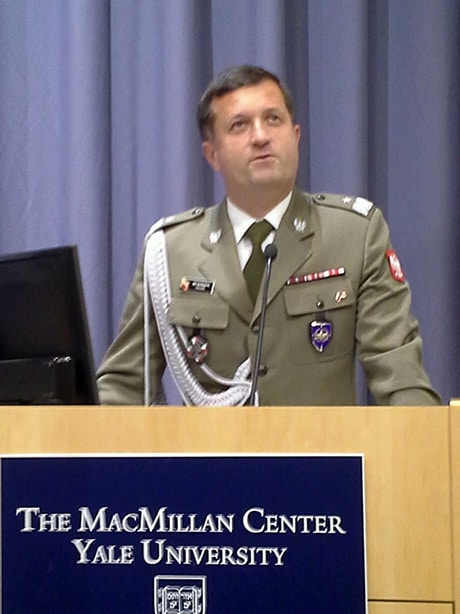
Gen.Jaroslaw Strozyk,Poland Defense Attache Washington
Brig. Gen. Jaroslaw Strozyk
Gen. Strozyk noted a build-up of military defense in Poland: U.S. tanks are now in Poland; Poland is about to procure medium-range missile defenses; and the country is procuring 40 attack helicopters and 40 new missiles for its F-16 fleet. “We took our lessons from the 2008 Georgia conflict,” said Brig. Gen. Strozyk. “We are ready for any contingency that might happen on our eastern border.”
During the Second Panel Session “25 Years of Democracy in Poland and the US – Polish Partnership: Military cooperation, Trade and Common Objectives” there were additional speakers Susan Bysiewicz, former Connecticurt Secretary of State (1999-2011), Elzbierta Matynia, Director of Transregional Center for Democratic Studies at the New School, Sabina Klimek, Head of Trade & Investment Section at the Polish Consulate in New York, Dr. Marek Chodakiewicz, Professor of History, Kosciuszko Chair of Polish Studies, the Institute of World Politics.
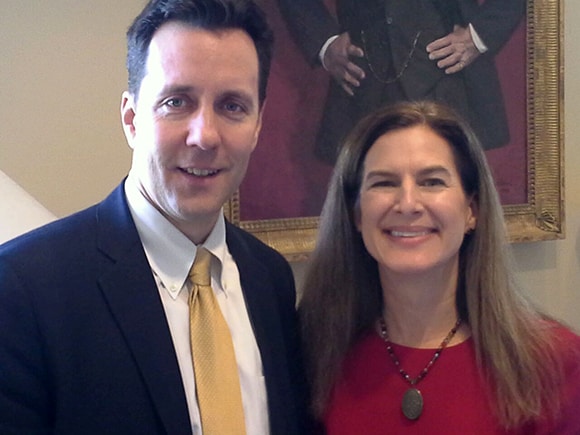
Paul Coyerand Susan Bysiewciz.
Susan Bysiewicz, a lawyer, a former Secretary of State in Connecticut shared about her experiences in serving as the elected State official in Connecticut for a few terms. Polish Americans are the third largest ethnic population in Connecticut.
Consul Klimek presented growing statistics with imports of Polish good and services to the United States in recent years. The financial value of it is about 4,6 billion USD. The exchange between USA and Poland is more balanced than in the past years when USA sold more goods and services to Poland.
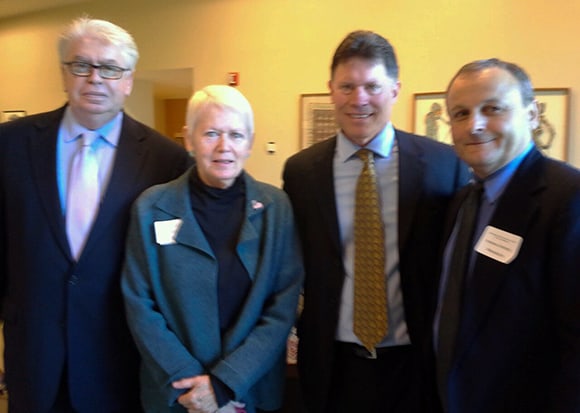
Marilyn Piurek with her husband Senator John Fonfara and Andrew Mikolajczyk.
Connecticut Senators Theresa Bielinski Gerratana and John Fonfara spoke during the Dinner at the Graduate Club. They shared their experiences in serving their constituents in their state.
Number of participants at APAC Conference talked about the recent visit of President Barack Obama at the Copernicus Foundation in Chicago to discuss immigration issues on November 25,2014. There were about 1800 people attending the event.
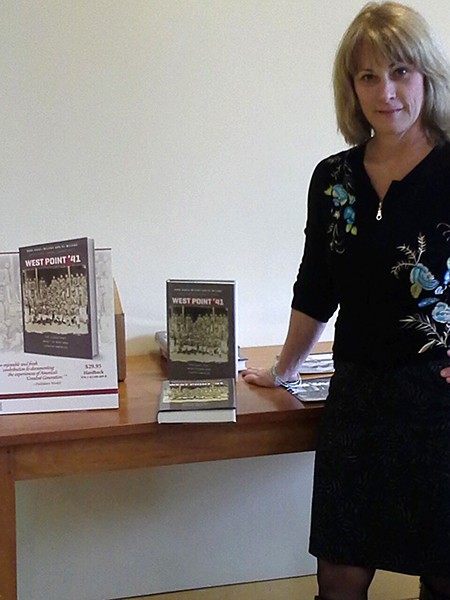
Wilcox-West Point
President Obama HAD met prior to his speech on immigration (for a large audience at the Copernicus Foundation), with different community leaders in the offices of the Polish American Chamber of Commerce where he listened their comments.
It is worth to mention that President Obama had attended number of the Polish American events, including the Taste of Polonia, Pulaski Day and other when he was the State Senator in Illinois and the Senator representing Illinois Constituents in the United States Senate.
A.M.
The American Polish Advisory Council (APAC) is an organization whose membership is comprised of prominent Americans of Polish decent. For more, visit
www.apaccouncil.info
